Lian Li PC-A76X Case Review: The Limits of Aluminum
by Dustin Sklavos on September 30, 2012 12:01 AM EST- Posted in
- Cases/Cooling/PSUs
- Lian Li
- HPTX
- E-ATX
Noise and Thermal Testing, Stock
Whatever my reservations were about the Lian Li PC-A76X's build quality, I still remained optimistic about the thermal performance. Their cooling design is clean, simple, and for the most part logical. While I think the case could've benefitted from separating and allowing for the removal of parts of the interior drive cage, you'll see it's a design choice that was not in the strictest sense necessary. Our stock test platform may actually be a bit too mild for the PC-A76X.
Testing was done with an ambient temperature of ~25C.
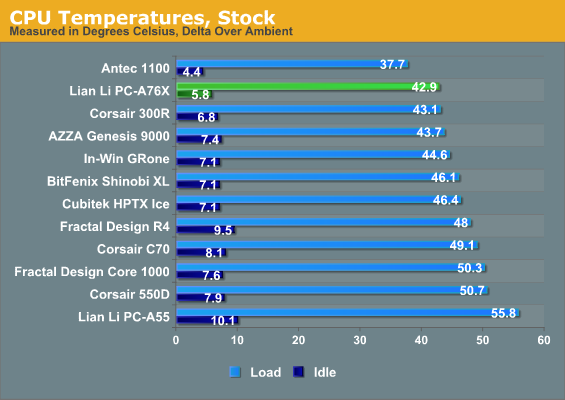
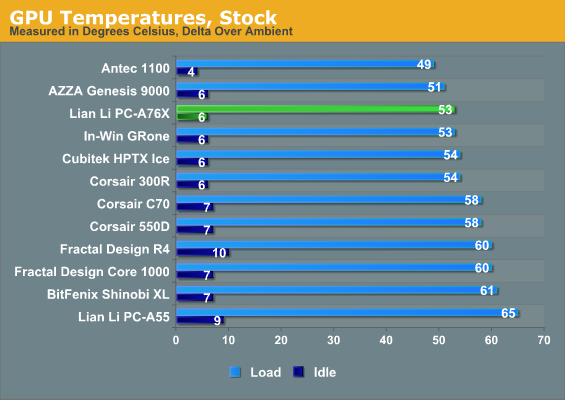
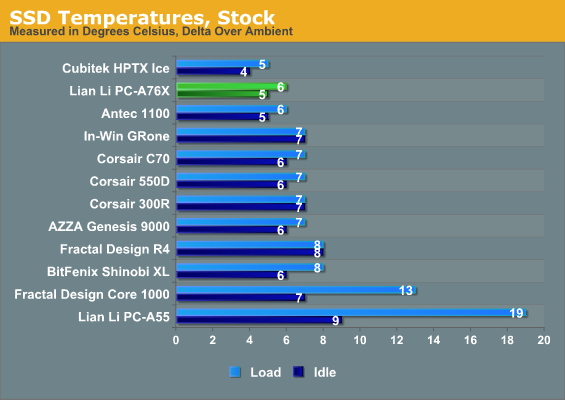
The PC-A76X's thermal performance is competitive at worst, excellent at best. The components all stay remarkably cool and leave plenty of headroom for upgrades.
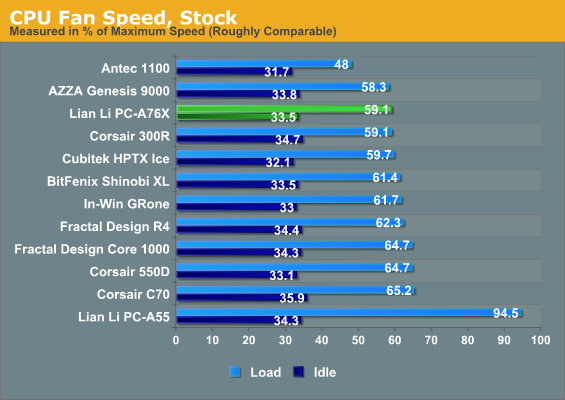
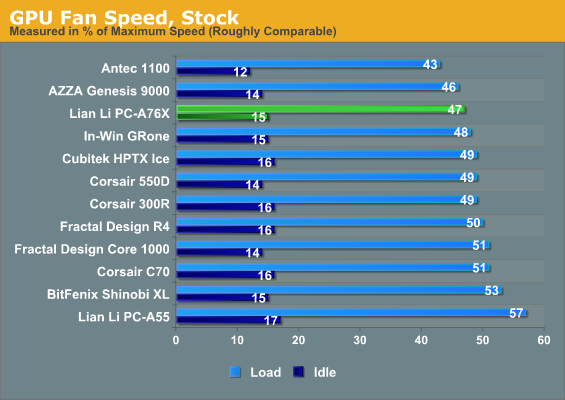
That headroom is echoed in the fan speed test results, which again are competitive with the other cases and promise a healthy amount of headroom.
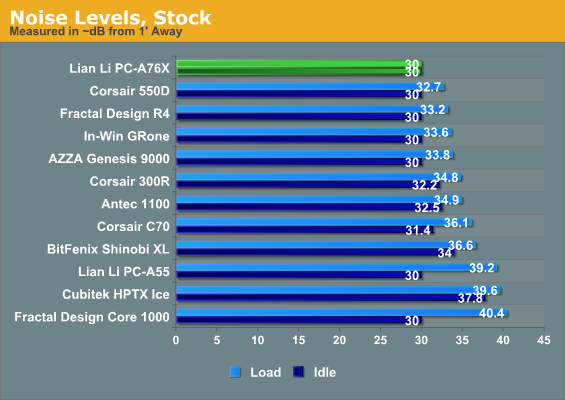
What's important to note is that the PC-A76X does a fantastic job of keeping things running quietly, even under load. The airflow design, spacious interior, and front door do a good job of muffling noise even without the benefits of any kind of acoustic foam padding.










61 Comments
View All Comments
Iketh - Sunday, September 30, 2012 - link
Thanks for sharing my thoughts, not just on this case but Lian Li in general. I want and have always wanted an all-aluminum case for years, but each time I look through Lian Li's stock, I'm left with that feeling of running your nails across a chalk board and I end up with a cheaper case. And that's coming from someone who bought the original Cosmos years ago...And, please, case engineers, stop including side vents... they're not needed anymore when you have slotted PCI covers... just give us robust intake solutions and that's it. I have never found a side intake fan that didn't rattle the door or make the case humm and I can only imagine how the case in this review would sound with the thin panels...
michaelheath - Sunday, September 30, 2012 - link
I've had a number of aluminum cases over the years, and, to be perfectly honest, the only ones that didn't feel chintzy were the cases that had other materials padding the panels and the frame. There really aren't many realistic benefits to using aluminum aside from weight - which doesn't mean much if you don't move your PC all that often. Aluminum certainly doesn't do much for heat dissipation or noise dampening, and Lian Li isn't alone in winding up with cases with middling performance that rattle and hum (though this particular case seems to avoid that).According to the rather thorough testing from Bit-Tech several months ago in their article, "The Big Air Cooling Investigation," where a Fractal Design Define R3 was tested with practically every reasonable (and a few unreasonable) configurations, it seems one of the most critical fan locations was in the side panel. Then again, as I mentioned before, the side panel is made of layered steel and plastic, not aluminum.
Perforated PCI covers don't really help much when they aren't in the direct path of convection, especially if they aren't in the direct path of moving air. Typically, they sit below most of the sources of heat in a computer case and don't provide any tangible benefit except for allowing another location for sound to escape.
cashkennedy - Sunday, September 30, 2012 - link
You obviously have never had a cooler master wave master , or a cooler master atcs, both are made of aluminum so thick, you cant even bend / dent it if you tried with all your strength. I believe the first year or two lian li was around they made cases out of similarly thick aluminum, and those were the years that aluminum cases got a good reputation, later they all started being made out of sheets thinner then a coke can, and add to that the fact that aluminum helping cool the components was all hype by retards who somehow didnt come to grasp the fact that none of your components are in direct contact with the aluminum (except for possibly the hard drives), so cant be cooled by the case...Iketh - Sunday, September 30, 2012 - link
actually there is obvious truth to aluminum keeping the AIR inside the case cooler... steel will act more as an insulator keeping the heat inside while aluminum will transfer that heat through the panels better, but it's negligible to the point of gimmickyrarson - Monday, October 1, 2012 - link
You've got that backwards. Aluminum is a poor conductor of heat, hence the outside of an aluminum case will likely stay cooler than a steel case. Steel is a good conductor of heat; a steel case gets hotter because it's transferring heat from inside the case to outside through the metal itself.sor - Monday, October 1, 2012 - link
My BS meter just went off. Nearly all metals are good conductors of heat, but aluminum, copper, and silver are among the best. Aluminum simply has less mass and doesn't RETAIN heat well, but it conducts heat just fine.Iketh - Monday, October 1, 2012 - link
sorry, but you're the one that's backwards, and generally lacking knowledge on the subject as illustrated with this statement:"Steel is a good conductor of heat; a steel case gets hotter because it's transferring heat from inside the case to outside through the metal itself."
BiggieShady - Tuesday, October 2, 2012 - link
If steel is a good conductor of heat, aluminum is better. For purely hot air contact it's negligible, however for direct contact it matters - that's why you have aluminum or copper heatsinks instead of steel.johnsmith9875 - Sunday, October 7, 2012 - link
Steel is a terrible conductor of heat. They're used in cases mainly because its inexpensive and easy to fabricate compared to aluminum.picobico2006 - Sunday, August 23, 2015 - link
Conducibilità termica di alcune sostanzeSostanza λ W·m-1·K-1 ρ Kg/m3
diamante 1600 3500 - 3600
argento 460 10490
rame 390 8930
oro 320 19250
alluminio laminato 290 2750
ottone 111 8430 - 8730
platino 70 21400
acciaio laminato 52 7850
piombo 35 11300
acciaio inox 17 7480 - 8000